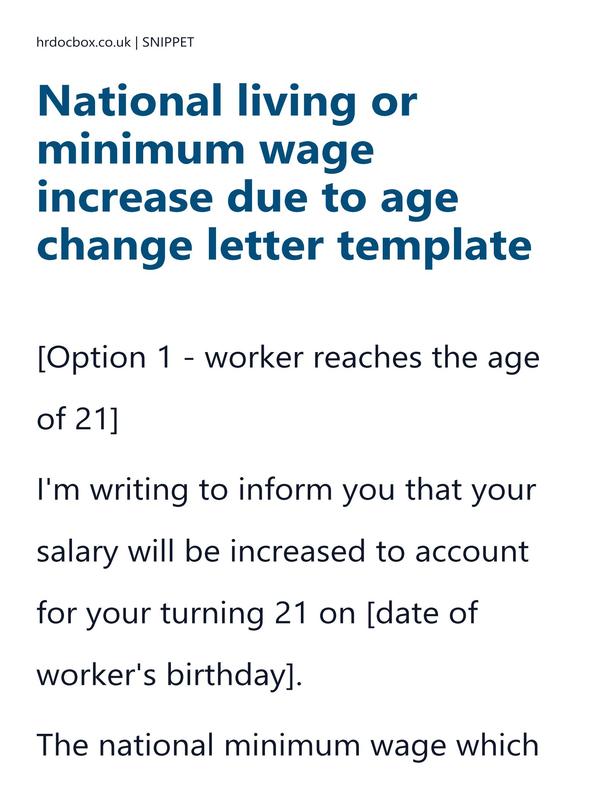National living or minimum wage increase due to age change letter template


Our National Living or Minimum Wage Increase Due to Age Change Letter Template simplifies communication of wage adjustments on emloyees reaching certain ages, ensuring compliance and fairness.
- Includes 12 months' access to the National living or minimum wage increase due to age change letter template, with all updates provided free of charge and notified to you.
- UK-specific accuracy.
- 198 words over 1 page.
- Last updated 03/04/2024.
- Format: Word / plain text / email.
- Delivery: Instant download after purchase (no physical item).
- Access: Download link shown here after checkout.
- This National living or minimum wage increase due to age change letter template will SAVE you up to 30 mins drafting & research, save you money, and reduce your risk.
[Sender name]
[Sender address]
[date]
[Recipient name]
[Recipient address]
Dear [Recipient first name],
Salary increase
[Option 1 - worker reaches the age of 21]
I'm writing to inform you that your salary will be increased to account for your turning 21 on [date of worker's birthday].
The national minimum wage which applies to workers aged 18 to 20, is £[amount] per hour. The national living wage, which applies to workers aged 21 and up,
This is a 30% preview of the National living or minimum wage increase due to age change letter template. For instant full access, purchase this item or a parent bundle.
National living or minimum wage increase due to age change letter template purpose
The National Living or Minimum Wage Increase Due to Age Change Letter informs employees about adjustments in their wage rates based on changes in age criteria for the national living or minimum wage. It communicates the revised wage rates and highlights the legal obligations of the employer to comply with updated wage regulations.
This letter serves to ensure transparency and clarity regarding wage adjustments, fostering trust and compliance with employment laws. By providing employees with timely and accurate information about their entitlements,
it contributes to maintaining positive employee relations and upholding legal standards in remuneration practices.
Minimum wage rates can be found at https://www.gov.uk/national-minimum-wage-rates.
Practical application of a National living or minimum wage increase due to age change letter template
- The National living or minimum wage increase due to age change letter template should be actioned / delivered ideally, no later than two weeks prior to the birthday of the applicable employee.
- It is sent / delivered by an employer / HR team to an employee.
Compliance
Compliance
This National living or minimum wage increase due to age change letter template incorporates relevant UK laws and HR standards, including those listed below:
-
The National Minimum Wage Act 1998: This sets out the legal minimum hourly rates that employers must pay their workers, and the criteria for determining eligibility for the minimum wage. Employers must ensure that they are paying their employees at or above the minimum wage rate.
-
The Employment Rights Act 1996: This outlines the statutory rights that employees have with regard to pay, including the right to receive a written statement of pay and deductions.
-
The Working Time Regulations 1998: This sets out the rules on maximum weekly working hours and rest breaks, which can impact the calculation of the minimum wage.
-
The Equality Act 2010: This prohibits discrimination on the grounds of age, gender, race, religion, disability, and other protected characteristics in relation to pay and employment. Employers must ensure that any pay increases are implemented fairly and without discrimination.
-
The Employment Relations Act 1999: This sets out the requirements for informing and consulting employees on employment matters, including changes to pay and conditions. Employers must consult with their employees on any changes to the minimum wage rate and ensure that they are given notice of any upcoming increase.
-
The National Minimum Wage Regulations 2015: This provides additional guidance on the calculation and payment of the minimum wage, including the treatment of tips and deductions. Employers must ensure that they are following these regulations when implementing a minimum wage increase.
Frequently Asked Questions about a National living or minimum wage increase due to age change letter template
Frequently Asked Questions about a National living or minimum wage increase due to age change letter template
-
Can I use the National living or minimum wage increase due to age change letter template in my small business?
Yes. The National living or minimum wage increase due to age change letter template is designed to be flexible and suitable for organisations of all sizes, including small businesses and charities. It follows UK employment law best practice, so even if you don't have an in-house HR team, you can confidently apply it.
-
Is the National living or minimum wage increase due to age change letter template compliant with 2026 UK employment law?
Absolutely. Like the National living or minimum wage increase due to age change letter template, all of our templates are drafted with the latest ACAS guidance and UK employment legislation in mind. We review and update them regularly, so you can be confident they remain compliant.
-
Can I customise the National living or minimum wage increase due to age change letter template for my organisation?
Yes, we highlight the areas of the National living or minimum wage increase due to age change letter template that you need to update with your own details, and where you need to make decisions to suit your situation. This saves you time and ensures that you meet best practice.
-
Do I get instant access to the National living or minimum wage increase due to age change letter template?
Yes. Once purchased, you'll be able to download the National living or minimum wage increase due to age change letter template instantly. Templates are provided in editable Word or Excel format so you can customise them easily, and in PDF format for easy sharing.
-
What if I need more help, not just a National living or minimum wage increase due to age change letter template?
If you're looking for broader support, we also offer toolkits and library bundles that include the National living or minimum wage increase due to age change letter template, along with other HR templates and policies for fully managing your situation. These may be more cost-effective if you need deeper advice.
-
Why should I use this National living or minimum wage increase due to age change letter template, and not AI to generate it?
The risk of using a free AI-generated template 'without review' includes your legal exposure, missing context, and no awareness of the wider process, whereas purchasing the National living or minimum wage increase due to age change letter template from us mitigates that risk.
